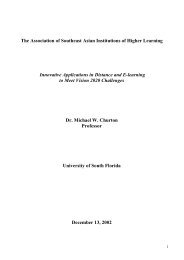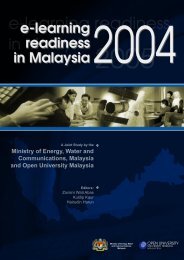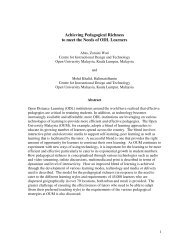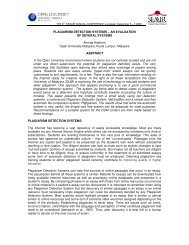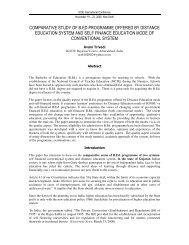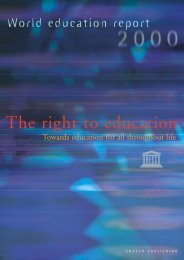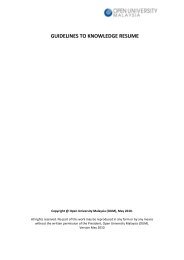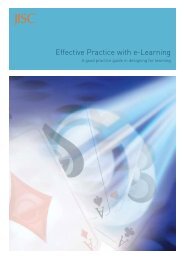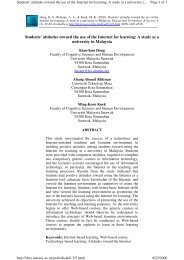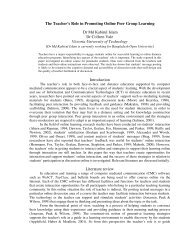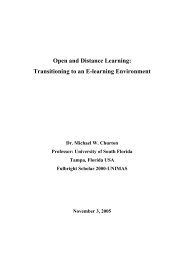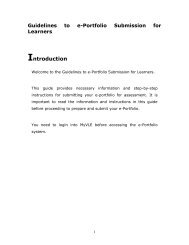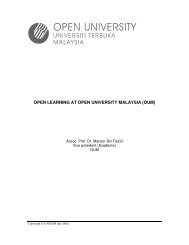The advent of e-<strong>learning</strong> precipitated a great deal of hyperactivity with widespreaddiscussion of the possibilities of setting up a for-profit e-<strong>learning</strong> sector. This wasparticularly true in the United States, where there was a longer tradition of mixing forprofit,non-profit private, <strong>and</strong> public <strong>education</strong> <strong>and</strong> training provision (Ryan, 2004:147). In the United States, vocational <strong>education</strong> <strong>and</strong> training for-profit is dominated bynational large-scale providers (DeVry, Corinthian, Strayer, ITT Educational Services).However, the actual proportion of the total market met through for-profit providers is(in the absence of reliable figures) debatable. Ryan (2004: 152) suggests that the impactof for-profit providers has been greatly exaggerated. Indeed, she argues (2004: 158)that “the individual student market is overwhelmingly in favour of public providers”because “tuition rates are cheaper than in for-profit providers, because reputable for-profitproviders are now more selective with rigorous entry criteria, <strong>and</strong> they direct poorlypreparedstudents to public providers”. Some commentators have seen for-profit e-<strong>learning</strong> as a retrogressive step back towards the worst excesses of the unregulated earlyprivate correspondence sector.SOME INNOVATIVE EXAMPLES FROM LATIN AMERICAThe peoples of Latin America live simultaneously in the three waves of economicdevelopment, agricultural, industrial <strong>and</strong> informational, <strong>and</strong> hence justifiably requirevarying approaches to <strong>distance</strong> study for <strong>higher</strong> <strong>education</strong> <strong>and</strong> <strong>lifelong</strong> <strong>learning</strong> (definedhere as any <strong>learning</strong> that is embarked on subsequent to the individual ceasing to attendthat period of full-time <strong>education</strong> embarked upon as a child). In some countries, itis sometimes a community of pedagogically conservative educators that holds backattempts at innovation (Litto, 2002), while in others it is simply the lack of the human<strong>and</strong> financial resources needed to set off ambitiously in this direction. Perhaps oneof the most high-reaching projects underway is TIDIA-Tecnologia da Informação noDesenvolvimento da Internet Avançada (Information Technology for the Developmentof the Advanced Internet), a three-year multi-institutional effort, to cost three millionUS dollars, <strong>and</strong> sponsored by FAPESP, the State Government of São Paulo’s Research-Support Agency. Sixteen research laboratories in public <strong>and</strong> private universities inthe State are at work on the collaborative development of a “suite” of interoperableapplications for <strong>distance</strong> <strong>learning</strong> on the Web, which will be open-source in nature,<strong>and</strong> will be made available without charge to all interested parties. It will include thesoftware programs necessary for online courses (including special cases such as thosefor music <strong>and</strong> mathematics), for non-courses but nevertheless <strong>education</strong>al environments(such as “digital caves” <strong>and</strong> other forms of virtual reality), for the construction of digitallibraries, museums <strong>and</strong> repositories of <strong>learning</strong> objects (all of which must have interfaceswith the course platforms), <strong>and</strong> for the preparation of dictionaries, encyclopedias,concordances, time lines <strong>and</strong> other reference tools that are part of the infrastructure for<strong>distance</strong> <strong>learning</strong>. Begun in mid-2004, it is expected to be tested <strong>and</strong> completed in 2007,<strong>and</strong> represents an example of a far-sighted public institution, recognising the hardshipfor individual <strong>education</strong>al entities to acquire commercial packages or to create in-houseclones of such packages, is investing in a solution that will benefit society, in its public<strong>and</strong> private faces, as a whole [www.tidia.fapesp.br].The CLACSO Virtual Campus is a most interesting example of a regional, multi-nationeffort to use Web-based <strong>distance</strong> <strong>learning</strong> organised by social scientists themselves,without any major injection of financial resources, <strong>and</strong> entirely self-sustaining throughstudent fees. CLACSO (Consejo Latinoamericano de Ciencias Sociales — LatinAmerican Council of the Social Sciences) is a non-governmental organisation uniting5000 specialists in 160 research <strong>and</strong> post-graduate study programmes in the social43
sciences in 21 countries of the region, including the Caribbean. Headquartered inArgentina, the Virtual Campus offers advanced online certificate courses, featuringmultinational faculty, in subjects like Indigenous Peoples: Globalization <strong>and</strong> thePlurinational State, Slavery in America, Another Urban Development: Inclusive Cities,Social Justice <strong>and</strong> Democratic Management, <strong>and</strong> The Public Space <strong>and</strong> the Privatizationof Education in the Americas [http://campus.clacso.edu.ar].Yet another example of how educators themselves are not waiting for governmentalor institutional initiatives, but are independently constructing “cottage industries” ofcontinuing <strong>education</strong> through <strong>distance</strong> <strong>learning</strong>, is that of Professor Maria Helena deAmorim Wesley, who retired in 2000 from the Federal University of Alagoas in Brazil’snortheast region in order to pursue her dream of initiating informal continuing <strong>education</strong>through the Internet. She sold her automobile, acquired two computers, <strong>and</strong> organised asmall group of volunteers to help her create a site which offers a hodgepodge of curiosarelated to Brazilian culture <strong>and</strong> history in the form of literary texts, scholarly documents<strong>and</strong> iconography that may eventually be useful to young <strong>and</strong> adult learners who discoverher minor treasures through searches on the Web <strong>and</strong> links offered by entities likethe Organization of American States <strong>and</strong> the Bibliothéque National in France [www.brasilbrasileiro.pro.br]. A more extensive hodgepodge of multimedia <strong>learning</strong> materials,but presently receiving 15,000 visitors daily because of the uniqueness of the materialsfreely offered, is the Virtual Library of the Student of the Portuguese Language, a sevenyear-oldproject of the University of São Paulo, which started with an initial grant fromthe AT&T Foundation, but now sustains itself modestly through occasional small, localgrants. It has achieved an enviable record of obtaining <strong>and</strong> making available through itssite large collections of hard-to-obtain audiovisual material produced by governmentalagencies, foundations, learned societies <strong>and</strong> corporations, <strong>and</strong> is now broadening itsscope to include materials originating in all of the eight countries in which Portuguese isthe official language [www.bibvirt.futuro.usp.br].Continued capacity-building of science teachers is a high priority in Latin America aselsewhere, <strong>and</strong> the Universidad Nacional de Córdoba, Argentina, is proud of achievingan important goal through a project that required careful financial planning. Whereascommercial vendors in the region were asking US $300 per teacher for participation in ayear-long Internet-based, English-language continuing <strong>education</strong> course, the Universityreceived a grant from the provincial Agencia Córdoba Ciencia S.E. that permitted it,under the “umbrella” of a research grant, to carry out a sophisticated programme forteachers of the natural sciences. The content involved subjects such as Evolution <strong>and</strong>Urban Solid Waste, Chagas’s Disease, <strong>and</strong> AIDS. Ten university staff members donatedtheir time to the content preparation, <strong>and</strong> hence it was possible to have a cost of onlyUS $30 per teacher for participation in the year-long course (Valeiras, 2005) [www.efn.uncor.edu/outros/educeva/home.htm]. The Universidad Nacional Autónoma de Méxicomantains several programs that promote research in <strong>distance</strong> <strong>learning</strong> as a form ofdiscovering which models may be most appropriate to local conditions.During the last three years, the Centro de Enseñaza de Lenguas Extranjeras (Centrefor Foreign Language Teaching) of the University has held five Web-based courses forteachers of languages, using a minimal staff of an engineer, an instructional designer, <strong>and</strong>ten specialists in applied linguistics, with highly satisfactory results [http://comenius.cele.unam.mx/alad].A final example of innovation in the financing of continuing <strong>education</strong> using <strong>distance</strong><strong>learning</strong> approaches is INTERLEGIS, a broad Federal Government of Brazil programmeat the national level, aimed at supporting the modernisation of the legislative branches of44
- Page 1 and 2: PERSPECTIVES ONDISTANCE EDUCATIONLi
- Page 3 and 4: The Commonwealth of Learning (COL)
- Page 5 and 6: ACKNOWLEDGEMENTSIn addition to the
- Page 7 and 8: These are some of the issues that a
- Page 9 and 10: What are the trends and issues in l
- Page 11 and 12: of policy implications relating to
- Page 13 and 14: evince important differences that c
- Page 15 and 16: inequitable regulations governing t
- Page 17 and 18: associations and groups of countrie
- Page 19 and 20: THE CONTRIBUTORChristopher McIntosh
- Page 21 and 22: INTRODUCTIONIn his 1996 report to U
- Page 23 and 24: Lastly, our analysis of the situati
- Page 25 and 26: diploma or similar certificates of
- Page 27 and 28: force of the undertaking. Here agai
- Page 29 and 30: RELEVANT INTERNET SITESUNESCO Task
- Page 31 and 32: Notes1. This phrasing has been used
- Page 33 and 34: goals (Daniel, 1996). Lifelong lear
- Page 35 and 36: eported that group activity had red
- Page 37 and 38: NEW AREAS FOR DISTANCE EDUCATION:WO
- Page 39 and 40: targets systematically for the use
- Page 41 and 42: Rausch, A.S. (2003). A case study o
- Page 43 and 44: correspondence teaching systems tha
- Page 45 and 46: significant differences between syn
- Page 47 and 48: In distance flexible- and blended-e
- Page 49 and 50: STATE-FUNDED DUAL-MODE SYSTEMS ATUN
- Page 51: Table 4.2: Fundable elements in dis
- Page 55 and 56: How a system is funded depends in p
- Page 57 and 58: Litto, Fredric M. (2004). Digital l
- Page 59 and 60: CHAPTER 5LIFELONG LEARNING IN THE A
- Page 61 and 62: education, which was initiated by C
- Page 63 and 64: So the virtual classroom acted as a
- Page 65 and 66: In June 2002, when the course came
- Page 67 and 68: RELEVANT INTERNET SITESFORCIIR proj
- Page 69 and 70: 11. The approximate rate for 1€ w
- Page 71 and 72: The term modern distance education
- Page 73 and 74: the National Networked Consortium f
- Page 75 and 76: important resource for undeveloped
- Page 77 and 78: standards have been proposed for th
- Page 79 and 80: The development of e-learning withi
- Page 81 and 82: RELEVANT INTERNET SITESCCRTVU Onlin
- Page 83 and 84: MoE (2004b) The Notice on Running N
- Page 85 and 86: CHAPTER 7QUALITY ASSURANCE SURVEYOF
- Page 87 and 88: (Paris, France, 28-29 June 2004) in
- Page 89 and 90: Examples of elaborated QA policies:
- Page 91 and 92: plans and produces its conventional
- Page 93 and 94: SHTVU (China)• Teaching• Teachi
- Page 95 and 96: offers its programmes to Turkish ci
- Page 97 and 98: mega universities apply a set of st
- Page 99 and 100: RELEVANT INTERNET SITESThe Commonwe
- Page 101 and 102: 2. QA initiatives or publications b
- Page 103 and 104:
assurance of ODL. This DST will be
- Page 105 and 106:
Educational Planning has been respo
- Page 107 and 108:
A system of weighting of the key qu
- Page 109 and 110:
RELEVANT INTERNET SITESHigher Educa
- Page 111 and 112:
CHAPTER 9THE FINNISH VIRTUAL UNIVER
- Page 113 and 114:
foreign providers. In Finland, the
- Page 115 and 116:
to make the best use of new educati
- Page 117 and 118:
The foremost task for the Service U
- Page 119 and 120:
part of quality management. The aim
- Page 121 and 122:
online courses; an educational tech
- Page 123 and 124:
polytechnics, research institutions
- Page 125 and 126:
CHAPTER 10PROMOTING CROSS-BORDERREC
- Page 127 and 128:
The Bologna Declaration was followe
- Page 129 and 130:
indicators currently being used for
- Page 131 and 132:
the qualification resulting from th
- Page 133 and 134:
Table 9.1: Outline of the portfolio
- Page 135 and 136:
• Make sure that incoming student
- Page 137 and 138:
CHAPTER 11CHARTING THE EVOLUTIONOF
- Page 139 and 140:
Another common characteristic was t
- Page 141 and 142:
the current capacity of the educati
- Page 143 and 144:
conditions for success. Conditions
- Page 145 and 146:
Cultural and ethical issues in inte
- Page 147 and 148:
the cost and maintenance of learnin
- Page 149 and 150:
Research can be a useful tool for c
- Page 151 and 152:
REFERENCESBates, A. (1995). Technol
- Page 153 and 154:
Twigg, C. (2001). Quality Assurance
- Page 155 and 156:
y, for example, entering into partn
- Page 157 and 158:
and even greater steps, and the dec



